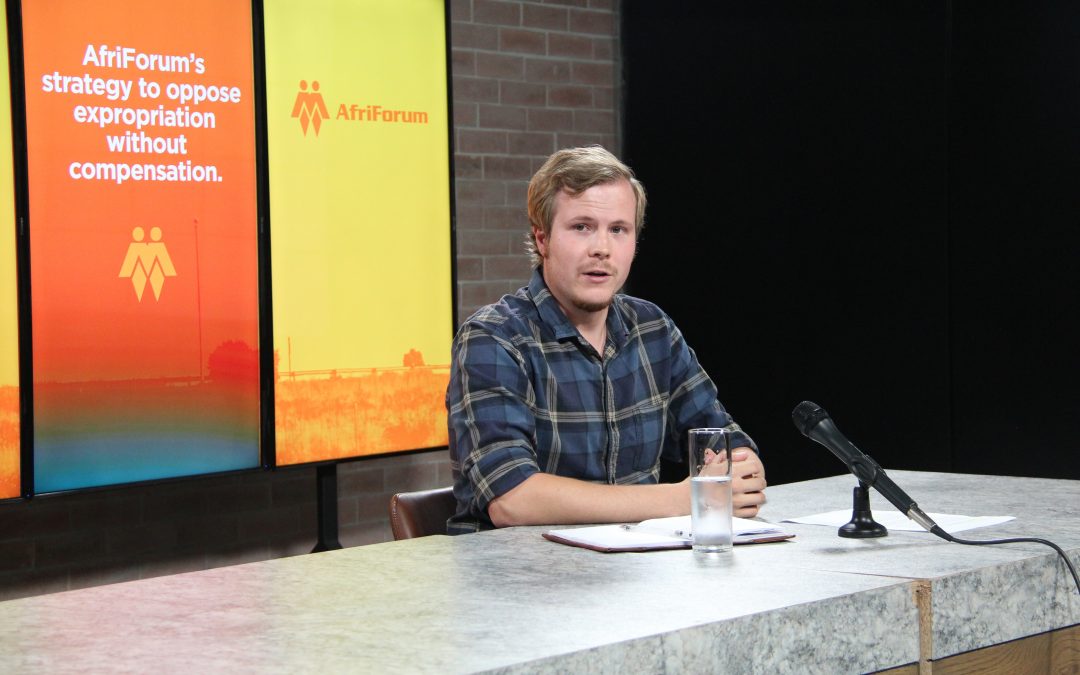By Ernst Roets
AfriForum is making good progress with its international campaign to raise support.
In April this year, the civil rights organisation again sent a delegation to the US as a follow-up to the progress made last year during a visit by me and Kallie Kriel, CEO.
In 2018, we especially wanted to send a strong message to South Africans that AfriForum intends to expand its campaign against farm murders and for the protection of property rights worldwide. In that respect, we did well.
The interview we had on Tucker Carlson Tonight (one of the most popular news programmes on US TV) helped a lot. However, even before the broadcast of that programme, when Pres. Cyril Ramaphosa appealed to us from parliament to return to South Africa, we already knew that our visit made an impact. That appeal was important because it showed clearly that government realise that they are being watched. It also showed that they take our campaign seriously – to the extent that it was important enough for the state president to take a stand on this issue in parliament.
This means we have succeeded in influencing the balance of power (to use the ANC’s term) in our favour. To date, the ANC and the government also made the most significant concessions regarding expropriation without compensation whenever the balance of power turned against them – which once again proves that asking nicely rarely is an effective strategy when dealing with a liberation movement.
Our visit to the US this year was a major breakthrough for other reasons. The tour did receive some exposure in South Africa, but that was not our focus. We wanted to turn strangers abroad into friends, and friends into activists – as we so often say at the office. We can boldly say that some influential people in Washington, D.C. are no longer strangers to us or only friends of AfriForum – they have become true activists for our cause.
Mariandra Heunis, a victim whose husband Johann was murdered in 2016, accompanied us on the tour to tell her story. In South Africa, we hear that kind of story so often that we have almost become accustomed to it. The fact that Mariandra was there and could tell her story in person to decision makers in Washington, D.C. left them with a very strong impression of the crisis on South African farms. We have also received more exposure to the rest of the US than ever. We had interviews with about 20 US radio stations and filmed interviews with Fox News, the Israeli news channel i24 and three online news platforms: The Blaze, One America News Network and The Daily Caller.
It is important to share the story of South Africa with people abroad, but it is not of much help if it is not followed up by some form of action. Therefore, our long-term strategy is to strengthen partnerships in Washington, D.C. and to get people there to take a stronger position on what is happening in South Africa. This will not happen overnight but in due course as a result of good relationships, reliable information and meaningful action.
During our last visit, we met with the State Department (Foreign Affairs) and with the offices of eight politicians in the Senate and House of Representatives. Most of the people to whom we talked currently serve on the foreign affairs committee. Although a lot still needs to be done, we believe that it will be possible for us to persuade this committee to take a stand.
We also had the opportunity to give a presentation to the Americans for Tax Reform, a pressure group with so much influence that Pres. George W. Bush sent representatives to their weekly meetings; they were deeply moved.
Another important part of our American liaison is to engage with research institutions, especially those advising government on international issues. Here, too, we made progress.
The next phase in our international campaign to raise support in the US will be to persuade benevolent people (including Afrikaners, South Africans and American friends) to write to their representatives. We believe this will play a significant role in bringing the crisis in South Africa to the attention of the US government and exert pressure on them. If you have contacts in the US or if you are there, watch www.worldwide.co.za. We will soon start with this campaign.
Do we expect the US government to solve our problems for us? Definitely not. We need to solve our own problems. However, history has taught that international lobbying should be vital to any pressure group who wants political change. And there is no better way to learn this lesson than by looking at the role international society played in South Africa.









